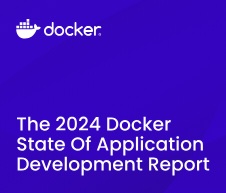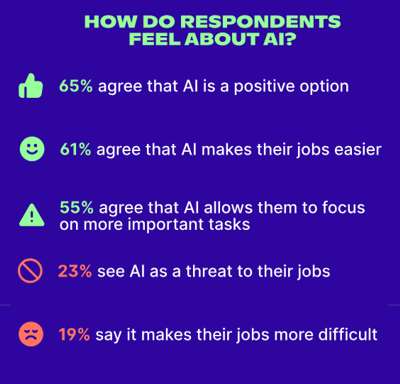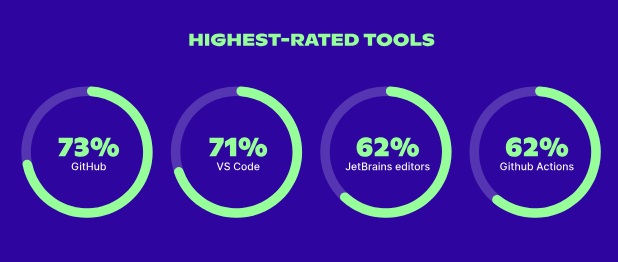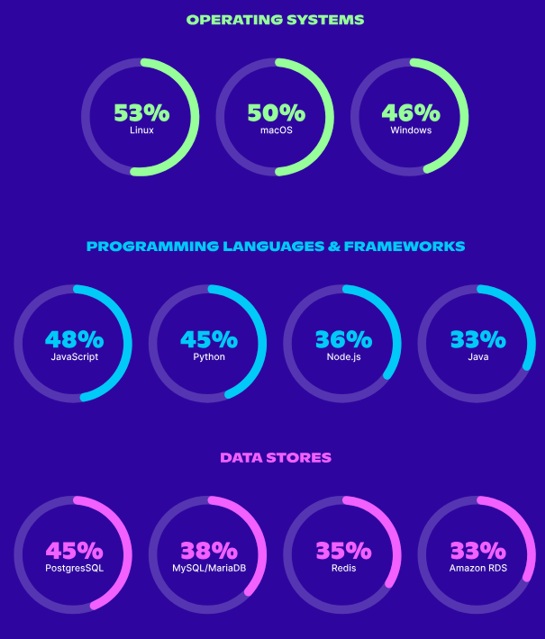| Docker Reveals The Application Development Landscape |
| Written by Sue Gee |
| Wednesday, 12 June 2024 |
|
The 2024 Docker State of Application Development Report is intended to provide a "deep-focus snapshot of the rapidly evolving world of software development today". Conducted by Docker’s User Research Team, the second annual survey asked more than 1,300 respondents a wide-ranging set of questions about their work including what tools they use and their Docker usage to their adoption of AI and involvement in open source. The findings presented in the report are based on 885 completed responses. The Docker survey confirmed the growing penetration of AI/ML into the software development field. Almost 2 in 3 (64%) of respondents reported already using AI for tasks including writing code (33%), writing documentation (29%), research (28%), writing tests (23%), troubleshooting/debugging (21%) and CLI commands )20%). Junior/mid-level developers and DevOps/platform engineers, expressed a higher dependency on AI compared with senior developers surveyed. In terms of AI tools, respondents most often used ChatGPT (46%), GitHub Copilot (30%), and Gemini (formerly Bard) (19%). This year’s survey also showed a growing interest in ML engineering and data science within the Docker community. When asked if they were working on ML in any capacity, almost half of respondents (46%) replied in the affirmative. Within that group, 54% said that they trained and deployed ML models in one or more projects, 43% worked on ML infrastructure, and 39% leveraged pre-trained ML models. The survey also probed attitudes to AI, finding that most respondents reported positive perceptions, with 65% saying they feel AI is a positive option, 61% agreeing it makes their jobs easier, and 55% saying it allows them to focus on more important tasks. A much smaller number of respondents view AI as a threat to their jobs (23%) or say it makes their jobs more difficult (19%). Another key insight was the growing popularity of developing software in the cloud. While almost 64% of respondents cited their laptop or desktop as their main development environment, more than 36% cited non-local environments, such as ephemeral environments, personal remote dev environments or clusters, and remote development tools such as GitHub Codespaces, Gitpod, and Coder. With regard to tools the most popular were GitHub, VS Code, JetBrains IDEs and GitHiub Actions.
The showed that the trend to microservices continues, with nearly three times more respondents saying they were transitioning from monolithic to microservices than were moving in the other direction, from microservices to monolithic (11%). A large majority of respondents (nearly 80%) said they use containers in application development, while only about 17% do not. When container users were asked where they primarily use containers, respondents’ answers span the lifecycle from development (76%) to deployment and testing (65% each) and production (61%). Among the broad array of containerization tools and technologies they use, respondents who use containers for development favor Docker Compose (71%), Docker Engine (57%), Kubernetes (42%), and Kubernetes with Docker Desktop (35%). The operating system of choice was Linux (53%), followed by MacOS (50%) with Windows used by only 46%, JavaScript emerged as the most popular language (48%), closely followed by Python (54%), while Java still has a substantial presence (33%) and PostgresSQL dominated as a data store. Another focus of the report was Open Source with 59% of respondents saying they contributed to open source in the past year, while 41% said they did not. Of the 41% who did not contribute, a large majority (72%) expressed interest in contributing to open source, while less than 25% did not. It also found that most employers appeared supportive of open source, with more than half of respondents (57%) saying their employer allowed them to contribute to open source as part of their job, and only 20% saying their employer did not. Looking into what prevents developers from contributing to open source, the biggest obstacle is time (40%). Other barriers included not knowing where to start (23%) and needing guidance from others on how to contribute (16%). .
More InformationDownload 2024 Docker State Of Application Development Report Related ArticlesRevealing The Top Skills For 2023 Remote Working and Developer Pay To be informed about new articles on I Programmer, sign up for our weekly newsletter, subscribe to the RSS feed and follow us on Twitter, Facebook or Linkedin.
Comments
or email your comment to: comments@i-programmer.info |
| Last Updated ( Wednesday, 12 June 2024 ) |





